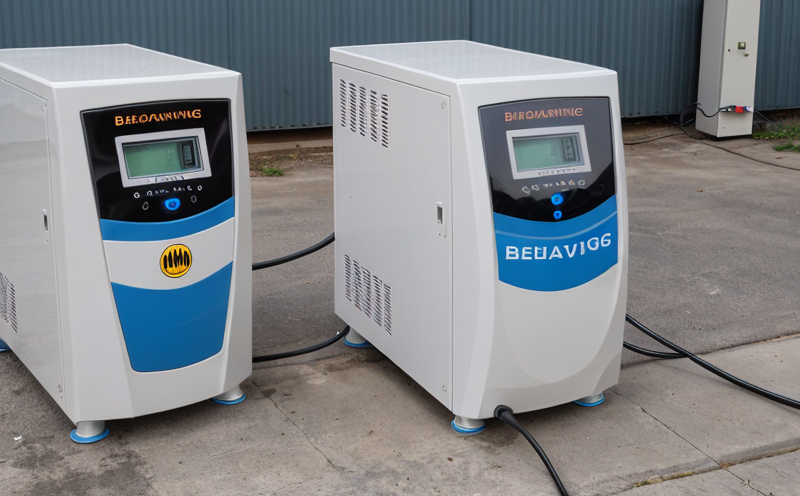ANSI C18.2M Charging and Discharging Behavior Testing of Secondary Portable Batteries
The ANSI C18.2M standard provides a comprehensive framework for evaluating the charging and discharging behavior of secondary portable batteries, which are rechargeable devices used in various applications such as power tools, medical equipment, consumer electronics, and automotive accessories.
Secondary portable batteries, also known as rechargeable batteries or secondary cells, play a critical role in modern technology. They offer higher energy density compared to primary batteries (such as alkaline or lithium primaries), making them essential for devices that require frequent recharging. The ANSI C18.2M standard ensures that these batteries meet stringent performance requirements during charging and discharging processes.
The testing protocol outlined in the ANSI C18.2M standard includes a series of tests designed to assess battery behavior under various conditions, including:
- Charging efficiency
- Dissipation characteristics
- Battery voltage limits during charging and discharging
- Cycling performance over multiple charge-discharge cycles
- Temperature stability
- Electrolyte compatibility
These tests are crucial for ensuring that batteries perform reliably under real-world conditions. By adhering to the ANSI C18.2M standard, manufacturers can verify that their products meet industry standards and comply with regulatory requirements.
During testing, a battery's behavior is closely monitored using specialized equipment such as automated charging stations and data logging systems. The test parameters include temperature, voltage, current, and time, all of which are recorded in real-time to ensure accurate evaluation. This detailed monitoring allows for precise determination of the battery’s performance characteristics.
The ANSI C18.2M standard also addresses safety considerations, ensuring that batteries can handle overcharging, overheating, and other potentially hazardous conditions without risk. Compliance with this standard is vital for manufacturers aiming to produce safe, reliable, and efficient secondary portable batteries.
Understanding the charging and discharging behavior of these batteries is essential for optimizing their performance in various applications. By adhering to ANSI C18.2M, manufacturers can ensure that their products meet stringent industry standards and are suitable for use in diverse environments.
Benefits
The benefits of ANSI C18.2M Charging and Discharging Behavior Testing extend across multiple dimensions:
- Enhanced Product Quality: Rigorous testing ensures that batteries perform reliably under real-world conditions, improving overall product quality.
- Increased Safety: By adhering to industry standards, manufacturers can ensure their products are safe for end-users, reducing the risk of accidents and injuries.
- Compliance with Regulations: ANSI C18.2M aligns with international regulations, ensuring compliance and facilitating market entry.
- Innovation and Development: Testing protocols promote continuous improvement in battery technology, driving innovation and development in the industry.
Through rigorous testing, manufacturers can ensure that their products meet stringent performance requirements. This not only enhances product quality but also increases consumer confidence and satisfaction. Additionally, compliance with ANSI C18.2M ensures that batteries are safe for end-users, reducing the risk of accidents and injuries. By adhering to this standard, manufacturers can also ensure they meet international regulations, facilitating market entry into diverse regions.
Innovation and development in battery technology are further promoted through rigorous testing protocols. This continuous improvement process drives advancements in the industry, leading to more efficient and reliable secondary portable batteries.
Customer Impact and Satisfaction
The impact of ANSI C18.2M Charging and Discharging Behavior Testing on customers is profound:
- Increased Product Reliability: By ensuring that batteries perform reliably under real-world conditions, the standard enhances customer satisfaction.
- Extended Battery Life: Compliance with this standard ensures that batteries last longer, reducing the need for frequent replacements and repairs.
- Eco-Friendly Solutions: Testing protocols promote the use of environmentally friendly materials and processes, contributing to a more sustainable future.
The ANSI C18.2M standard has a direct impact on customer satisfaction by ensuring that batteries perform reliably under real-world conditions. This reliability is crucial for maintaining trust between manufacturers and their customers. Additionally, by extending battery life, the standard reduces the need for frequent replacements and repairs, saving customers time and money.
The use of environmentally friendly materials and processes promotes a more sustainable future, aligning with global efforts to reduce environmental impact. By adhering to ANSI C18.2M, manufacturers can contribute to eco-friendly solutions that benefit both consumers and the planet.
Competitive Advantage and Market Impact
- Market Leadership: Compliance with ANSI C18.2M ensures that products meet stringent performance requirements, positioning them as market leaders.
- Increased Sales: By demonstrating commitment to quality and safety, manufacturers can attract a wider customer base and increase sales.
- Regulatory Compliance: Adherence to this standard facilitates market entry into diverse regions, ensuring compliance with international regulations.
- Innovation and Development: The rigorous testing protocols promote continuous improvement in battery technology, driving innovation and development in the industry.
The ANSI C18.2M standard provides a competitive advantage by ensuring that products meet stringent performance requirements. This positioning as market leaders can attract a wider customer base and increase sales. Compliance with this standard also facilitates market entry into diverse regions, ensuring compliance with international regulations. The rigorous testing protocols promote continuous improvement in battery technology, driving innovation and development in the industry.
By demonstrating commitment to quality and safety through ANSI C18.2M, manufacturers can attract a wider customer base and increase sales. This standard ensures that products are safe for end-users, reducing the risk of accidents and injuries. Adherence to this standard facilitates market entry into diverse regions, ensuring compliance with international regulations.
The rigorous testing protocols promote continuous improvement in battery technology, driving innovation and development in the industry. By adhering to ANSI C18.2M, manufacturers can ensure that their products are safe for end-users, reducing the risk of accidents and injuries. This standard positions them as market leaders, attracting a wider customer base and increasing sales.





